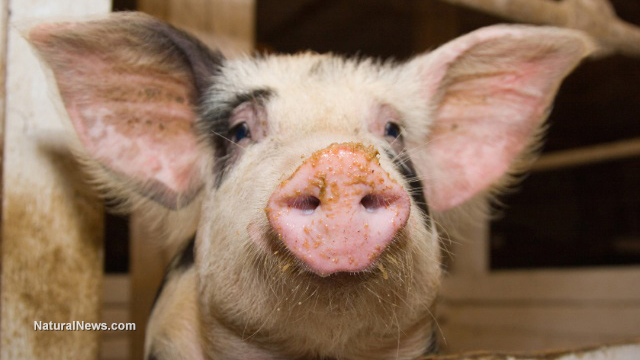U.S. researchers now growing human organs inside animals to be sacrificed for transplants; Genetically altered chimeras an assault on Mother Nature
Wednesday, January 20, 2016 by: Jennifer Lea Reynolds
Tags: human-animal chimeras, genetic research, ethics

(NaturalNews) Just when you think the world can't get any more bizarre, it does.
Case in point: the latest in "let's play Mother Nature" news, is that United States researchers now have their sights set on growing human organs ... inside farm animals. Oh, but it gets better. The point of all of this? It's to then take the Franken-organs and use them for transplant procedures, despite the fact that not enough is known about this. As a result, there are lots of folks with Island of Dr. Moreau movie thoughts.
At the very least, ethical concerns abound.
Wow!
Talk about inter-species dilemmas, ethical boundaries being pushed, and of course, a distinct departure from Mother Nature unfolding as it should: without humans severely interfering, and ultimately compromising life, every step of the way.
The plan involves growing human tissue inside the likes of pigs and sheep, so that livers, hearts and other organs can be created and used for transplants. Such injections of cells from one species into the embryo of another creates mixtures that are referred to as "chimeras." In the case of incubating human organs in farm animals, human-animal chimeras are created.(1)
The NIH's stance: not funding these Franken-efforts
The eyebrow-raising technique has drawn criticism from the National Institutes of Health (NIH), who just a few months ago, reversed their previously-held decision about such methods. A September 2015 announcement by NIH said that, "The National Institutes of Health (NIH) is informing the research community that it will not fund research in which human pluripotent cells are introduced into non-human vertebrate animal pre-gastrulation stage embryos while the Agency considers a possible policy revision in this area." The agency goes on to say that, "NIH will not consider requests for administrative supplements or revisions to any grants or modification to R&D contracts that include costs for or involve research introducing human pluripotent cells into non-human vertebrate animal pre-gastrulation stage embryos. Ongoing NIH awards will be addressed with the awardees on a case-by-case basis."(1,2)The NIH, therefore, has made it clear that they frown on the idea across the board, ranging from current research funding requests and contract proposals which are pending submission, to peer reviewed competing applications. It was the discovery that such efforts were occurring from other funding sources (including a $1.4 million grant from the U.S. Army that will focus on growing human hearts in swine), that spurred the NIH to make such declarations.(1,2)
Researchers pressing forward despite 'negativity towards all chimerism studies'
In particular, three research teams are said to be involved with human-animal chimera efforts (two in California and one from the University of Minnesota). Despite there not being any published scientific papers touting these teams' so-called successes, MIT Technology Review believes that approximately 20 pregnancies of pig-human or sheep-human chimeras have taken place over the past year in the United States. However, none of these animals have been brought to term.(1)As you might guess, human-animal chimera advocates are scratching their heads over the NIH's funding decisions, most notably in a letter touting the benefits of growing human organs in farm animals. The letter, penned by several university professionals, including Daniel Garry, a cardiologist who leads a chimera project at the University of Minnesota, states, "By eliminating federal funding for this research, the NIH casts a shadow of negativity towards all chimerism studies regardless of whether human cells are involved." The letter appeared in Science magazine, where the authors also state their collective belief that such efforts are essential for learning purposes, including gaining an understanding of disease, development and therapeutic discoveries.(3)
Animals with human hair and human intelligence on the horizon?
On the flip side, are those who fear that some of these animals might end up taking on behaviors and physical characteristics that are eerily representative of humans. We're talking about animals with a close to human-like thinking ability, or perhaps ending up with patches of human hair. "We are not near the island of Dr. Moreau, but science moves fast," says NIH ethicist David Resnik. However, the says that, "The specter of an intelligent mouse stuck in a laboratory somewhere screaming 'I want to get out' would be very troubling to people." The scenario he presents is worrisome to many people, although Hiromitsu Nakauchi says he's not concerned.Nakauchi is a stem-cell biologist at Stanford University who has attempted to make human-sheep chimeras. The picture painted by Resnik, he feels, is an over-exaggeration. "If the extent of human cells is 0.5 percent," he says, "it's very unlikely to get thinking pigs or standing sheep. But if it's large, like 40 percent, then we'd have to do something about that."
Sources for this article include:
(1) TechnologyReview.com
(2) Grants.NIH.gov
(3) Science.ScienceMag.org[PDF]
Human-animal chimeras at FETCH.news
Get independent news alerts on natural cures, food lab tests, cannabis medicine, science, robotics, drones, privacy and more.
Take Action: Support Natural News by linking to this article from your website
Permalink to this article:
Embed article link: (copy HTML code below):
Reprinting this article:
Non-commercial use OK, cite NaturalNews.com with clickable link.
Follow Natural News on Facebook, Twitter, Google Plus, and Pinterest
- Newly released JFK files reveal Pentagon's role in creating Lyme disease and covid in the same lab
- Discovery of vast underground city beneath Giza pyramids challenges human history
- Black cumin seed oil emerges as a powerful ally against breast cancer and chronic inflammation
- Sugar-free deception: Artificial sweeteners hijack hunger signals, fuel obesity epidemic, study warns
- Kiss Your Genetic Privacy Good-Bye! 23andMe Gets Green Light to Sell Your Intimate Genetic Details to Anyone They Want
- Aluminum pollution: A silent threat to human health
- Dr. Suzanne Humphries makes bombshell appearance on Joe Rogan podcast, exposing vaccine industry deception back to POLIOMYELITIS
- Sweden's migrant crisis deepens as failed green energy venture leaves thousands jobless, exposes systemic collapse
- Is the vaccine-autism debate reopening? Washington Post sparks controversy with preemptive hit piece on David Geier
- Analysis: The coming economic collapse, a mass uprising and Trump's three secret weapons to halt the growing revolt
- A handful of pecans a day could keep heart disease at bay, study finds
- The mighty Eggplant: An underrated superfood with ancient roots
- RFK Jr. slashes HHS bureaucracy, saves taxpayers $1.8B while refocusing on chronic disease epidemic
- Challenging the status quo: “America Fooled” by Timothy Scott exposes the myths about antidepressants
- The great crypto power struggle: How technocrats and governments are reshaping global finance
- AI breakthrough slashes celiac disease diagnosis time from months to minutes
- Understanding the difference: “Food Allergies and Food Intolerance” by Dr. Jonathan Brostoff and Linda Gamlin
- HIGH-FAT FOOD DEPRESSION: Scientists discover why obesity takes away the pleasure of eating
- Newly released JFK files reveal Pentagon's role in creating Lyme disease and covid in the same lab
- Analysis: The coming economic collapse, a mass uprising and Trump's three secret weapons to halt the growing revolt
- Trump nominates VACCINE ZEALOT Susan Monarez to lead the CDC, sidelining RFK Jr.'s reform efforts
- Trump's greatest betrayal so far: Accelerating Middle East wars, silencing dissent, and serving Zionist masters
- Dr. Mike Yeadon releases 15-minute testimony - WATCH - about genocidal intent of COVID “vaccines”
- Festive flavors: The sweet history, nutritional profile and health benefits of pecan pie
- Elon Musk: Aliens could be here on Earth RIGHT NOW
- Big Pharma's $8 Billion bribery scheme exposed: how doctors are pushed to prescribe junk science, not heal
- 5 Simple steps to boost your brainpower: How to strengthen executive function in a distracted world
- Trump reverses course on Gaza plan, says “nobody is expelling Palestinians”
- A lack of integrity in Academia: Harvard professor found GUILTY of fraudulent research to promote CRT theory
- Reclaim your health: How midlife exercise reverses years of inactivity
- Survival 101: Effective EMF blocking techniques
- Florida takes a stand: DeSantis proposes permanent ban on mRNA vaccine mandates
- Sugarcane extract superior to cholesterol-lowering drugs?
- California's social media censorship law struck down: A victory for free speech or a threat to online safety?
- OpenAI whistleblower who dissented against how the company trained ChatGPT found dead
- EPA advisor admits the agency is funneling billions to climate groups ahead of Trump’s return to White House
- EPA advisor admits the agency is funneling billions to climate groups ahead of Trump’s return to White House
- Newly released JFK files reveal Pentagon's role in creating Lyme disease and covid in the same lab
- California's social media censorship law struck down: A victory for free speech or a threat to online safety?
- Dr. Mike Yeadon releases 15-minute testimony - WATCH - about genocidal intent of COVID “vaccines”
- The Health Ranger releases “Vaccine Zombie” song and music video, using AI-animated zombies for the music video
- The pandemic as a tool for INDOCTRINATION: Understanding “The Indoctrinated Brain” by Dr. Michael Nehls
- Florida takes a stand: DeSantis proposes permanent ban on mRNA vaccine mandates
- “Why we influenced the 2020 elections”: Facebook files reveal the coordinated effort to bury the Hunter Biden laptop story
- Mike Adams releases country western hit single: Goin’ Back in Time is Comin’ Home
- Mike Adams releases music poetry sensation: A Child of God
- Unpacking the Lies That We’ve Been Fed – new song and music video released by Mike Adams, the Health Ranger
- Michigan sheriff announces criminal investigation into 2020 election crimes, Dominion Voting Systems
- Migrants are taking advantage of recent hurricanes to scam residents and loot their homes
- House Intelligence Committee calls for the ARREST and PROSECUTION of Dr. Anthony Fauci
- RFK Jr. clears key hurdle: Sen. Susan Collins backs controversial HHS nominee, signaling a new era for health policy
- Rep. Nancy Mace introduces bill to ban biological males from female facilities on federal property
- Peter Rost exposes Big Pharma corruption in his book “The Whistleblower: Confessions of a Healthcare Hitman”
- Mike Adams releases new song and music video: Nothing More Disgusting Than a Globalist
- Red Cross issues warning to stop blood plasma donations from vaccinated people
- Scientists confirm: GENIUS brain function can be spontaneously unleashed in humans without any apparent cause
- EPA advisor admits the agency is funneling billions to climate groups ahead of Trump’s return to White House
- HYSSOP: What research reveals about the health benefits of this ancient holy herb
- Two containers with completed ballots fall out of truck in Florida
- Fully vaccinated about to see “tsunami” of illness and death, warns virologist
- Global leaders unite to clamp down on “misinformation” with UN-backed Cascais Declaration
- BREAKING: 2025 NDAA authorizes mandatory military draft of WOMEN across America… as Pentagon pursues global NUCLEAR war with both Russia and China at the same time
- Michael Yon warns of a ZIONIST TAKEOVER in Trump’s second administration
- BOMBSHELL: DNA testing kits are a SCAM to develop ethnic-specific bioweapons
- Ozempic and Wegovy weight loss drugs are injectable LIZARD VENOM PEPTIDES that may unleash a devastating wave of organ failure… side effects align with symptoms of SNAKE BITES
- Israeli soldiers accused of even more torture and abuse in the West Bank
- These 13 countries just signed an agreement to engineer a global FAMINE by destroying food supply
- NASA admits that climate change occurs because of changes in Earth’s solar orbit, and NOT because of SUVs and fossil fuels
- RFK Jr. clears key hurdle: Sen. Susan Collins backs controversial HHS nominee, signaling a new era for health policy
- Sermon 30: How Jesus reveals Caesar’s FAKE CURRENCY and FALSE AUTHORITY
- Coriander seeds: Ancient medicine backed by modern science
- Arizona officials claim Maricopa County needs 10-13 days to tabulate results of the election
Science News & Studies
Medicine News and Information
Food News & Studies
Health News & Studies
Herbs News & Information
Pollution News & Studies
Cancer News & Studies
Climate News & Studies
Survival News & Information
Gear News & Information
News covering technology, stocks, hackers, and more



"Big Tech and mainstream media are constantly trying to silence the independent voices that dare to bring you the truth about toxic food ingredients, dangerous medications and the failed, fraudulent science of the profit-driven medical establishment.
Email is one of the best ways to make sure you stay informed, without the censorship of the tech giants (Google, Apple, Facebook, Twitter, YouTube, etc.). Stay informed and you'll even likely learn information that may help save your own life."
–The Health Ranger, Mike Adams












































